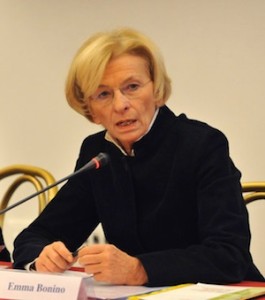Europe: The Schengen Agreement In Danger
ROME, Feb 26 (IPS) - Exclusion of Greece from the European free travel zone established by the Schengen Agreement is pending. The European Commission has ruled that the Athens government has "seriously neglected its obligations to control its own borders," and if the deficiencies are not corrected within three months, the other member states of the Schengen area may exclude it from the agreement.
 Emma BoninoIn 2015, some 850,000 people seeking asylum and work in northern European countries passed through Greece, and the influx is continuing.
Emma BoninoIn 2015, some 850,000 people seeking asylum and work in northern European countries passed through Greece, and the influx is continuing.
However, excluding Greece from the Schengen area would be useless, as well as harmful to other countries such as Italy. The solution to the migrant crisis does not lie in isolated measures like this one, but in a community-wide policy that is long-term and broad in scope.
But the European Union continues to tackle its problems in isolation and without a comprehensive vision, as in the case of Greece.
Expelling Greece from the Schengen area makes no sense in the first place, because the country has no terrestrial borders with the Schengen area and so its land borders already operate as non-Schengen.
The effective isolation of Greece would result in migrants being concentrated in the country. They would try to travel onwards by sea or to reach Italy through Albania.
Doubts raised about free circulation in the Schengen area are not only affecting Greece. Austria, for example, has recently imposed controls on its border with Italy.
Therefore, with or without Greece, the Schengen Agreement is in danger. For Italy, the potential economic cost has been estimated at 6.5 billion euros a year.
Over and above the economic aspect – which is no small matter – one of the pillars of the European Union is being brought into question. The migrant crisis is a serious humanitarian problem, but it is being dealt with as if it were a political problem. That is to say, the mood of the electorate is given preeminence, instead of attempts being made to manage the problem.
The only exception appears to be German Chancellor Angela Merkel, who is firmly maintaining her position of openness to migration, in spite of the facts that elections in her country are approaching, and therefore her leadership is on the line.
This is how real leaders behave. Merkel is the only government leader in Europe with a political vision. She is examining and analysing reality, instead of being carried away by the hysteria that would have us believe that waves of immigrants are preparing to flood the European Union to commit rape and many other crimes.
The truth is different. We must not forget that between 2008 and 2014, even in the worst stages of the financial crisis, the European Union granted 2.5 million residence permits every year. The majority of the public mistakenly thinks that these were mostly for Syrians and Iraqis.
The largest group was in fact Ukrainians, followed by U.S. citizens, Chinese and Indians. The United Kingdom, which takes a hard line on migrants, nevertheless admitted 568,000 in 2014 alone, according to Eurostat, which also indicates that the country receiving the greatest number of work permits was Poland.
Recalling these facts helps to destroy the stereotype of an invasion of Europe. There is no such thing: the European Union is capable of receiving immigrants and in fact is doing so. Furthermore, it needs an influx of immigrants to compensate for its demographic deficit.
However, a stingy and shortsighted policy presents the image of a continent of over 500 million people with the highest levels of wellbeing and life expectancy behaving as if it were threatened by the arrival of one million refugees and immigrants.
If Europeans are incapable of facing real facts and addressing them with an appropriate community policy, how will they cope in the year 2050, when Nigeria alone will have as many people as the euro zone and the total African population will reach four billion?
Translated by Valerie Dee
© Inter Press Service (2016) — All Rights Reserved. Original source: Inter Press Service
 Global Issues
Global Issues